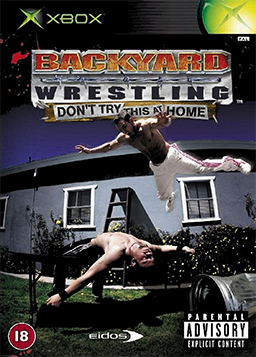Backyard Wrestling: Don't Try This at Home
| Backyard Wrestling: Don't Try This at Home | |
|---|---|
 |
|
| Developer(s) | Paradox Development |
| Publisher(s) | Eidos Interactive |
| Designer(s) | Kevin Gill |
| Series | Backyard Wrestling |
| Platform(s) | PlayStation 2 Xbox |
| Release | |
| Genre(s) | Sports, Fighting |
| Mode(s) |
Single Player Multiplayer |
| Review scores | ||
|---|---|---|
| Publication | Score | |
| PS2 | Xbox | |
| EGM | 5.67/10 | 5.67/10 |
| Famitsu | 27/40 | N/A |
| Game Informer | 5.5/10 | 5.5/10 |
| GamePro | N/A | |
| GameSpot | 4.7/10 | 4.8/10 |
| GameSpy | ||
| GameZone | 7/10 | 6.5/10 |
| IGN | 6.5/10 | 6.5/10 |
| OPM (US) | N/A | |
| OXM (US) | N/A | 5/10 |
| Maxim | 2/10 | 2/10 |
| Playboy | 75% | 75% |
| Aggregate score | ||
| Metacritic | 51/100 | 50/100 |
Backyard Wrestling is a video game developed by Paradox Development, and published by Eidos Interactive in 2003 for PlayStation 2 and Xbox.
The goal of backyard wrestling is largely to use the environment to defeat an opponent. The gameplay could be better described as a cross between classic pro wrestling video games and 3D platform fighting like Power Stone.
Aside from the standard backyard locations, Backyard Wrestling's arenas include a truck stop, a slaughterhouse, an outdoor parking lot, a talk show set and a strip club. Each environment is littered with barbed wire-laden bats, fluorescent light bulbs, breakable tables, steel chairs and other objects players may use to injure their opponents.
The game has a "Story" like mode, entitled "Talk Show Mode" circling around a show called "Today's Topic", which resembles The Jerry Springer Show. The talk show host, a nameless character that resembles Kevin Gill, one of the game's creators, interviews different victims and personalities of backyard wrestling. After the interview, the character is placed where the victim is and will fight three other backyard wrestlers. They will face three opponents with one health bar.
The game received mixed to negative reviews on both platforms according to video game review aggregator Metacritic. In Japan, Famitsu gave the PlayStation 2 version a score of one seven, one six, and two sevens for a total of 27 out of 40.
A sequel, Backyard Wrestling 2: There Goes the Neighborhood, was released in 2004 for PlayStation 2 and Xbox.
...
Wikipedia
